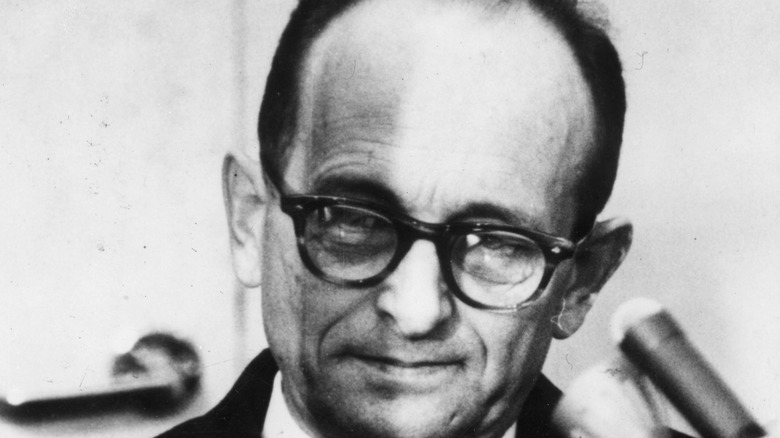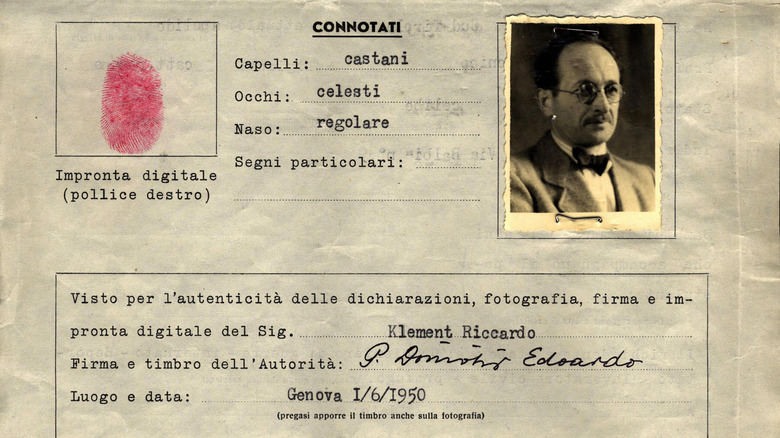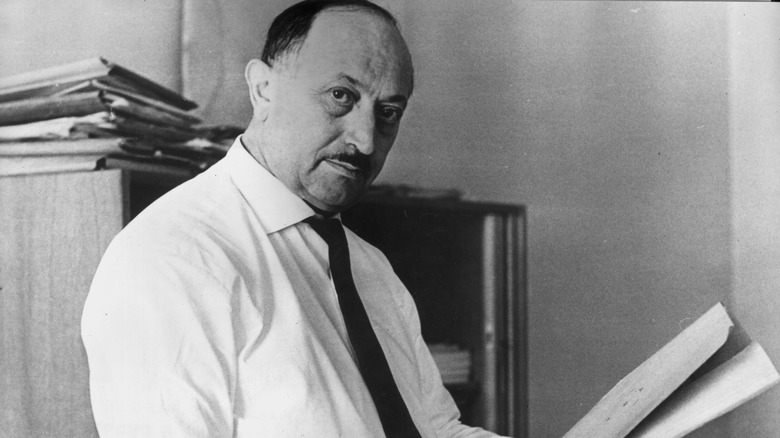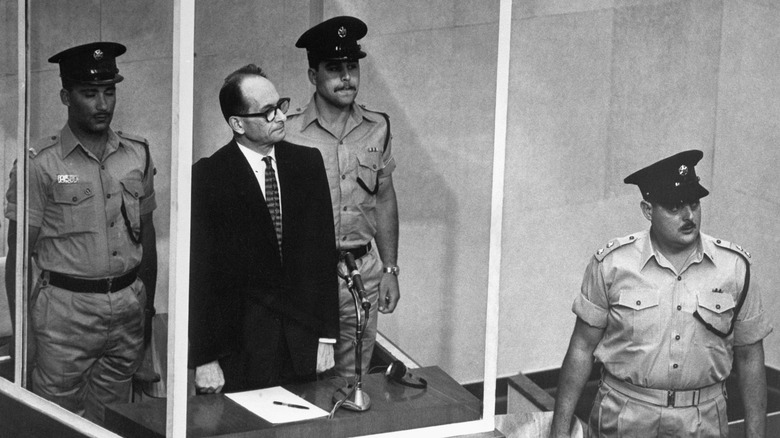The Truth About The Intense Manhunt For Adolf Eichmann
Adolf Eichmann was one of the key players in the design of the "Final Solution," the Nazi plan that called for the genocide of all Jews during World War II. Eichmann himself formulated the logistics of the Holocaust, especially the deportation of Jews to extermination camps (via Holocaust Encyclopedia).
Eichmann didn't complete his university education and seemed to jump from one job to the next during his youth, working as a day laborer and a traveling salesman, among many other things. After losing his job during the Great Depression, Eichmann joined the Austrian National Socialist (Nazi) Party and eventually the SS (the elite corps of the Nazi Party), according to Britannica. He advanced quickly within the SS and by 1939 he was part of Himmler's Reich Security Central Office in Berlin.
During the 1942 Nazi Wannsee Conference, Eichmann was put in charge of coordinating the "final solution." According to Britannica, he was in charge of identifying, gathering, and transporting Jews from occupied Europe, first to ghettos and then eventually to extermination camps like Auschwitz. Between April and July 1944 alone, Eichmann oversaw the deportation of 440,000 Hungarian Jews (per Holocaust Encyclopedia). By the end of the war, he had sent millions to their deaths.
Eichmann was captured by U.S. forces in 1945 but soon escaped and went into hiding in Germany and Austria for five years. Then in 1950, Eichmann took advantage of the "ratlines," a system of escape routes helping Nazis flee Europe for safer lands (via Britannica).
New horizons awaited on the other side of the ocean
Ratlines were mainly directed toward South America — Argentina, Brazil, and Paraguay. This was in large part the result of Argentinian President Juan Perón encouraging Nazis and collaborators to come over. Understanding the "why" is hard, and it was probably the result of many factors. Although Argentina remained neutral during the war, Perón aided the Axis powers in secret. Anti-Semitic immigration laws in Argentina and Peron's admiration for both Italian fascist Benito Mussolini and Germany's well-organized military power might have played a part, too (per ThoughtCo).
So did leaders of the Catholic Church. Perón's agents helped coordinate escape routes with Catholic bishops, who provided hiding points (mainly monasteries and churches) to Nazis who were escaping Germany and making their way towards Italy. Once in Rome and Genoa, the two main meeting points, the church would help war criminals obtain falsified Red Cross passports and visas. Argentina, a country of European immigrants, also had a large German community that helped bankrolled the operation. As a thank -ou for the help of the church, Eichmann converted to Catholicism later on (via Deutsche Welle).
In 1950, Eichmann boarded a steamship toward Buenos Aires, Argentina, where he would live a quiet, undisrupted life for the next decade. According to Britannica, he arrived in Argentina under the name Ricardo Klement. For the first two years, he worked at CAPRI, an hydroelectric power plant company owned by German-Argentine businessman and Nazi sympathizer Horst Carlos Fuldner. This was the first employment stop for many Nazis arriving in Argentina (via Spiegel International).
In Argentina, Eichmann lived a perfectly normal life
In 1952, Eichmann's wife and children arrived in Argentina, and by the following year, the entire family had moved to the country's capital to start a new life together. There, Eichmann jumped from job to job, just as he had done in his younger years, until he landed a position as a welder and mechanic at a Mercedes-Benz plant.
Eichmann could've lived the rest of his life in quiet hiding in Argentina, but he had two big problems: he liked to drink and he liked to talk. He soon started attending meetings organized by Nazi immigrants and even had coffee with Auschwitz's "Angel of Death," Dr. Josef Mengele, before Mengele escaped to Brazil. Later on, Eichmann sat down with a local journalist and Nazi sympathizer for an interview, where he expressed that his only mistake was not having murdered all of Europe's Jews. As quoted by Spiegel International, Eichmann lamented that "We didn't do our work correctly. There was more that could have been done."
Soon, rumors reached Europe and Israel about Eichmann's whereabouts. For several years, Germany's Office for the Protection of the Constitution, the CIA, and Nazi-hunter Simon Wiesenthal (pictured above) exchanged messages and details on Eichmann, but things moved slowly. Without an extradition agreement in place between Germany and Argentina, it became clear the official routes weren't going to work to catch Eichmann (via Spiegel International).
It took a covert operation to finally capture Eichmann
In 1960, a team from Mossad, Israel's national intelligence agency, arrived in Buenos Aires ready to abduct Eichmann and bring him to Israel for trial. According to the Israel National News, it took the team only a few days to track down Eichmann through a Jewish family whose daughter had befriended Nicolas Eichmann, one of Adolf Eichmann's children. Nicolas had a habit of boasting about his father's Nazi connection and the Mossad soon knew all they needed to know about their target.
On May 11, 1960, the team grabbed Eichmann as he was walking from a bus stop to his apartment, pushed him into a car, and took him to a safe house. His family never called the police.
He was held for nine days and interrogated for 275 hours, which were transcribed into 3,564 pages. Eichmann revised and then signed the entire statement, in which he denied any personal responsibility for the Holocaust and claimed he was just following orders (via Haaretz). On May 20, the Mossad drugged Eichmann and got him on board a plane under the guise of being an airline worker who had suffered an accident. His trial in Jerusalem was the first trial ever to be televised.
His trial began April 11, 1961. On December 15 Eichmann was found guilty of crimes against humanity and 14 other charges. He was hanged on May 31, 1962. He was cremated; his ashes were thrown into the sea (per History).



